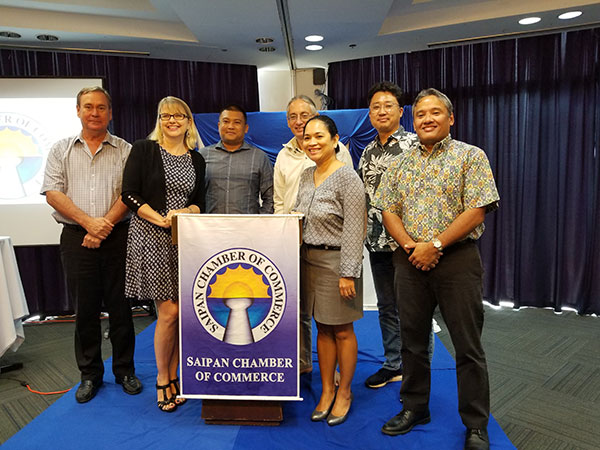Legislative fix on CW-1 Act sought

Saipan Chamber of Commerce president Velma Palacios, fifth left, joins guest speaker Alex Sablan, right, and other board members of their group in yesterday’s general membership meeting at the Seaside Hall at Kanoa Resort. (Jon Perez)
The Northern Marianas Business Alliance Corp. is seeking a legislative fix to two provisions of the Northern Mariana Islands Workforce Act of 2018, where foreign workers need to exit the CNMI for 30 days and the 10-day requirement to return to the Commonwealth once the CW-1 permit has been issued.
NMBAC chair Alex Sablan said these provisions in Public Law 115-218 would be an issue for the CNMI in the future, depending on how the new law that extends the CNMI Only Transitional Worker visa program up to 2029 is implemented.
Subsection A (i) states that “a permit for a Commonwealth-Only Transitional Worker (I) shall remain valid for a period that may not exceed one year; and (II) may be renewed for not more than two consecutive one-year periods.
“At the expiration of the second renewal period, an alien may not again be eligible for such a permit until after the alien has remained outside of the United States for a continuous period of at least 30 days prior to the submission of a renewal petition on their behalf,” it says in subparagraph (ii).
Sablan said the 30 days that the foreign worker needs to be out of the CNMI after the second renewal period could either be implemented in 2020 or 2021—“depending on how the interpretation of the law plays out.”
“We’re asking in the interim rules to move that timeline…and not immediately so it gives us time to work on legislation to fix it. The only way to get it done is to have a legislative fix,” said Sablan, who was part of the CNMI delegation that lobbied the U.S. Congress to pass the CW-1 extension.
He added they are hoping the timeline would be renewed since the 30-day break could mean a huge reduction again in the CNMI workforce. “At the end of the day, what we’re talking about here is in 2020 or 2021, 90 to 95 percent of all CW-1 workers will have to depart the Commonwealth. …Break completely in their employment in the Commonwealth [and] renew in that timeline. So, in today’s world, we can start the process in April of the current fiscal year for the next [FY] application [and] not with the break. The break requires that you start after you they depart the Commonwealth.”
Sablan said they would seek to abolish the provision or seek a staggered implementation. “So obviously we can’t have a mass exodus of our workers in two years and so we’re asking to get a legislative fix that will stagger that period.”
“If not, we would like to get it abolished but [if] we can’t get it abolished, then we would ask that to stagger that timeline over 12 to 24 months so people have the ability to renew and come back within the reasonable timeline.”
Another issue that they want to be fixed is the 10-day requirement for a guest worker under the CW-1 visa program to come back to the CNMI once the permit has been released. Sablan said 10 days isn’t enough to process the other needed documents.
“We don’t think that’s a sufficient time to [process documents] overseas. …We’re asking that timeline be extended to 30 to 45 days so that individuals have the ability to return to the Commonwealth without the advent of a [Customs and Border Protection] officer interpreting that they are beyond their time and they are not able to re-enter the Commonwealth with an invalid travel document or even the visa itself. What we’re asking for is to extend that to rectify those two concerns regarding the CW.”



























